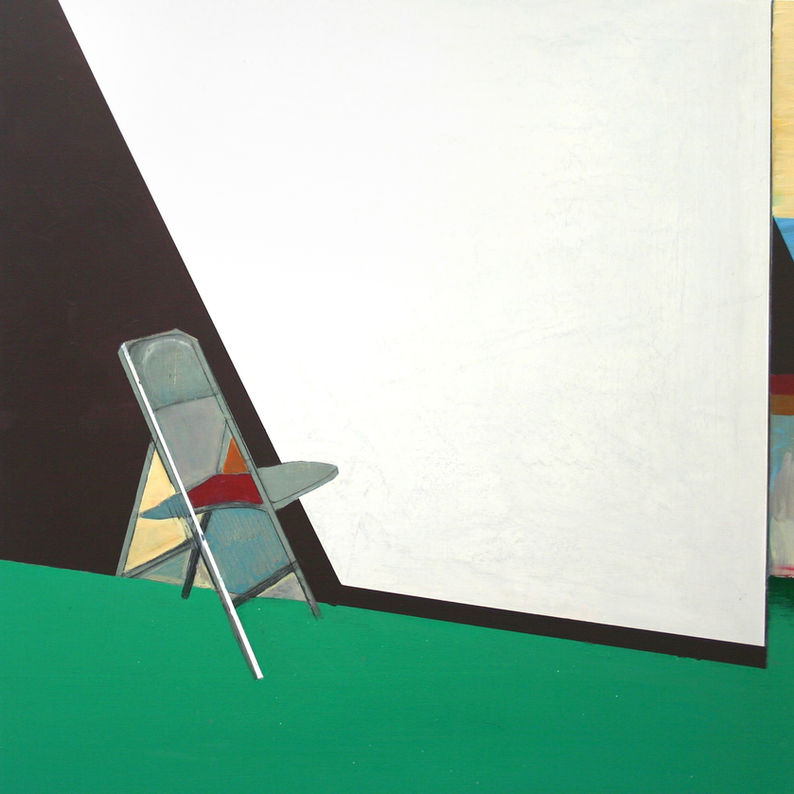Loading Video . . .
Focusing on the idea of "perception," we are pleased to feature two works by painter Paul Trapp, "Substantiate" and "Behind". Paul paints images of ordinary objects and places derived from empirical observation, however, he employs various strategies to alter or distort the observed spaces.
1 Corinthians 13:12
On Perception
By
Paul Trapp
Credits:
Artist Location: Illinois
Curated by:
Charis
2010
24 x 24 inches (both works)
Acrylic on panel

Primary Scripture
Loading primary passage...
Loading Passage Reference...
Share This Art:
(The artists words are in italics. Additional commentary from Spark+Echo Arts drawn from conversations with the artist.)
I want to know more about our sensory experience of God's creation, and how we can use our imaginations to experience this world in new ways. I think we take for granted what is right in front of us, so in my paintings I try to counteract this inactive approach to seeing. I use planar space to distort common objects to show that although things may appear to be ordinary, they are not. I not only depict what my eyes see but I also paint spatial anomalies in my work that do not happen in reality. I contrast representational and planar painting space because it is foundational or "common" to the picture plane — like objects are to this world. For, a new perspective on common experience only requires an active curiosity to see one's surroundings as unique, magical, and new.
(Paul Trapp)
Paul says that this body of work "investigates perception and the phenomenological concept of intentionality" or, "how an object is seen as apposed to how it is mentally approached." Paul quotes Joseph Campbell where he notes that there may be a conflict between what a (Christian) artist sees and what he or she may believe: "People say that what we're all seeking is a meaning for life. I don't think that's what we're really seeking. I think that what we're seeking is an experience of being alive, so that our life experiences on the purely physical plane will have resonances with our own innermost being and reality, so that we actually feel the rapture of being alive."
(Campbell, Joseph. "The Message of the Myth." The Message of the Myth. TV mini-series with Bill Moyers. PBS. 1988.)
Connecting the Real with the Ideal
We are reminded of Paul (the Apostle)'s well-known chapter about love that he wrote to the Corinthians. Though most people – able to cite the reference or not – may be able to quote, "Love is ___, love is ___, ‚..." there is a seminal passage in that chapter that we draw in reference to Paul (the artist)'s thoughts on perception: 1 Corinthians 13:12 "For now we see only a reflection as in a mirror; then we shall see face to face. Now I know in part; then I shall know fully, even as I am fully known." Perhaps the Apostle Paul was pulling from his philosophic background, drawing a reference to what Plato muses on regarding the ideal nature of things. We see in Paul Trapp's paintings both the ideal and the real, parts of the whole – a vibrating connection between what we know to be rooted in this world and what we find in moments of beauty and transcendence.
I parallel the visual aspects of my work (representational and planar space) with the concepts involved in my work (perception and intentionality). This contrast is intended to raise questions concerning subjective experience in the objective world, and to suggest that actively observing objects in daily life leads to a new awareness of daily surroundings. Ultimately, I use this visual conflict to create an unexpected visual experience where something new can be discovered within something familiar and to bring to consciousness the experience of seeing.
(Paul Trapp)
Spark Notes
The Artist's Reflection
Paul Trapp was born in Madison, Wisconsin and has studied at Minnesota State University and in Florence, Italy. Currently he teaches at Illinois State University. His studio work investigates perception and the phenomenological concept of intentionality. His work has been shown in Washington, New York, Italy, and Malaysia. His work is in the collection of Penang State Museum & Art Gallery and Bethany Lutheran College.
Paul Trapp

About the Artist
Paul Trapp
Other Works By
Related Information


Loading Video . . .






